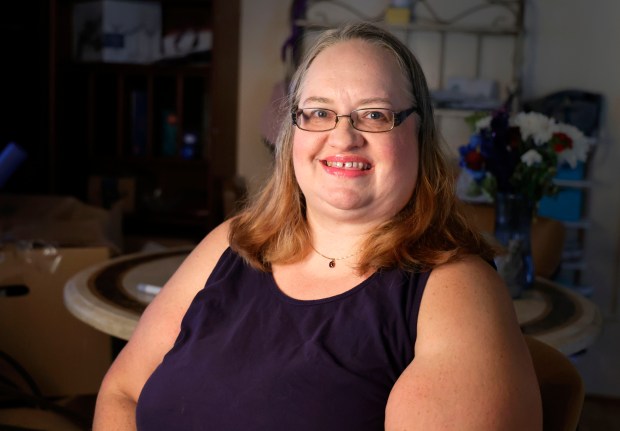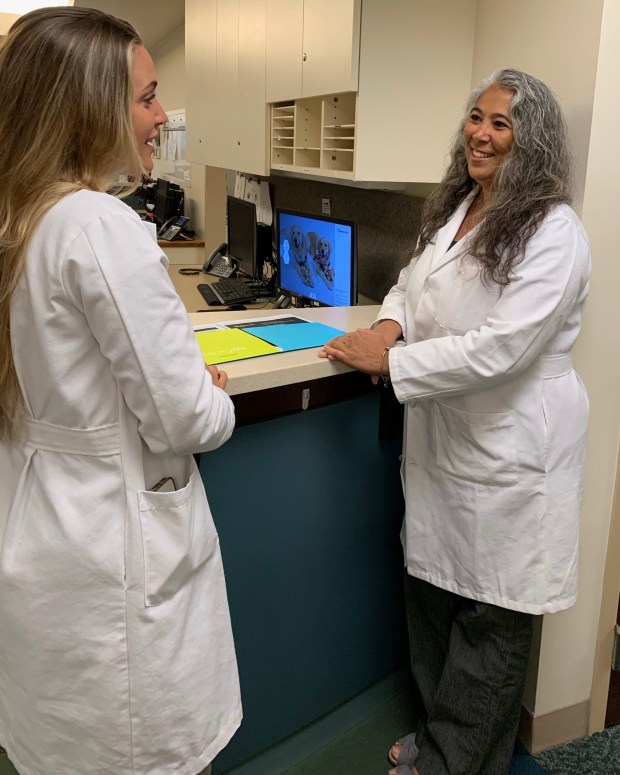For most of her life, Jennifer Kirtley, 56, has been so consumed by thoughts of food that immediately after eating breakfast, she would think about her lunch menu.
Recently, Kirtley has gone most of the day without eating, a noticeable change in behavior that came just three and a half months after she started taking Wegovy, a popular weight-loss drug. “It’s amazing to have to think about eating,” said Kirtley of Lake Worth Beach. “But when I’m eating less, I know I have to pay attention to what I’m eating and make sure I’m getting the nutrients I need.”
Kirtley started weighing 300 pounds on April 1 and has lost 35 pounds by taking weight-loss medication under a doctor’s supervision. She follows a carefully planned diet rich in lean protein, vegetables and water.
“To avoid losing muscle mass, I focus on protein, not calories,” she said.
GLP-1 drugs like Wegovy, Ozempic and Mounjaro have been game changers for weight loss, slowing digestion and increasing feelings of fullness after eating. But South Florida dietitians warn that taking weight-loss drugs can be risky if you don’t eat the right diet. Everything from bones to muscles can atrophy when you lose weight too quickly. They guide patients on how to eat while on medication without harming their bodies.
“If someone doesn’t know how to eat while on these medications, they can go from one problem to another,” said Lillian Craggs-Dino, a registered dietitian and support group coordinator for the Bariatric and Metabolic Institute at Cleveland Clinic Florida. “It’s easy to become vitamin deficient.”

Side effects are difficult to manage
Ten GLP-1 drugs, including a class of drugs called semaglutides, are FDA-approved to treat type 2 diabetes or weight loss. Most are given by self-injection and work by regulating insulin production and lowering blood sugar levels. The most common side effects are gastrointestinal symptoms, including nausea, vomiting, diarrhea and constipation. Dietitians say symptoms can often be managed: diarrhea by drinking plenty of water and avoiding dairy and high-fiber foods, and constipation by eating more fiber and drinking plenty of water.
“It may not be the medications that are causing the nausea or constipation, but rather your diet. Maybe someone is eating too fast or choosing the wrong foods,” Craggs-Dino said.
At Cleveland Clinic Weston, Craggs-Dino conducts a comprehensive evaluation before a patient starts taking weight-loss medications to find out if a patient has any vitamin deficiencies, to learn about their lifestyle habits and to discover their food allergies, likes and dislikes. She then creates a meal plan
“The medication will help change your behavior because you will feel full, but you still need to eat balanced meals with lean proteins, fats, whole grains and vitamins,” she said. “Some people are not hungry and they don’t eat. If you don’t eat, you’re not nourishing your body and you lose muscle mass along with fat.”
Some people need vitamin supplements, while others need more “good fats,” she said.
Losing weight quickly without proper diet and exercise can decrease bone density and lower resting metabolic rate, which can lead to sarcopenia, which is the gradual loss of muscle mass, strength, and function that makes it difficult to perform everyday activities like climbing stairs. Dietitians say that the ideal for anyone taking these medications is to eat about 25 to 30 grams of protein per meal to preserve muscle.
Kirtley says she’s tried all sorts of diets and seen her weight fluctuate, while remaining obese. Her eating habits included regular visits to Dunkin Donuts and Popeye’s. But that’s in the past. She started taking a low dose of Wegovy in April and plans to make more changes to her diet as she gains weight. She tracks her water and protein intake with an app on her phone, and allows herself protein shakes and bars.
“I knew from the beginning that I wanted to change my diet,” she said. “I hoped it would help me make better food choices, and it did.”
What you need to know before self-injecting
Although the internet is full of photos of people losing weight thanks to semaglutide, taking weight-loss drugs without any training is a mistake, dietitians say. These drugs are designed to be used in combination with a healthy diet and exercise.
“Education is a critical piece that many people lack,” said Amy Kimberlain, a registered dietitian in the cardiometabolic clinic at Baptist Health’s Miami Cardiac & Vascular Institute.
“You have to understand how medications work, what’s happening in your digestion and how to change what you eat and when you eat it,” she said. “You have to mitigate the side effects that might be caused by what you eat.”
Since you’re not counting calories, you should fill your plate with nutrient-dense foods even when you’re in maintenance mode, she said. She recommends high-quality protein sources like fish, chicken, eggs, tofu, tempeh, yogurt, cheese and seafood. Foods to avoid include baked goods, soda, processed foods, fatty cuts of meat and high-sodium foods like pickles and cold cuts. Fats and carbohydrates can eventually be added to your diet.
Dr. Christopher Thompson, a specialist in surgical weight loss, said some people aren’t good candidates for weight-loss drugs, even with a diet plan. Thompson, a Harvard medical professor and founder of Bariendo, recommends having your bone and muscle density checked before you start taking them. If your numbers are low, weight-loss surgery may be a better option, he said. Thompson performs a unique endoscopic stomach-tightening procedure to lose weight. However, he also prescribes medications, noting that patients who take them need a game plan that includes resistance training and long-term dietary changes.
“If you start taking this medication, plan on taking it for the rest of your life,” he said. Even after reaching a weight-loss goal, research shows that most people will need to continue taking the medication indefinitely, likely at a low dose. “Those who stop taking the medication find that the weight regain is typically faster than the time it takes for people to lose the weight in the first place,” he said. “The weight comes back quickly and in a stronger way.”

Navigating popularity and cost
Ozempic, originally intended for type 2 diabetes, made its way to weight loss in 2023. Thanks to its popularity, the U.S. Food and Drug Administration approved a similar drug, Wegovy, for chronic weight management. Insatiable demand saw the arrival of Mounjaro (tirzepatide) in late 2023, and now a new, apparently more effective drug called retatrutide is in the works. The challenges with these drugs in South Florida and across the country are cost and availability. In South Florida, everyone from chiropractors to MedSpas to virtual doctors are prescribing them. The cost can be prohibitive—as much as $1,000 or more per month—and finding the necessary doses can be difficult.
But compounding pharmacies are stepping in, making their own versions of the drugs semaglutide and tirzepatide at lower costs and in varying dosages.
That’s the path Martin Katz, 78, is following. He says he uses a compounding pharmacy to make lower-cost doses of tirzepatide because Medicare doesn’t cover it for obesity. He relies on dietitian Craggs-Dino at Cleveland Clinic Weston to guide his diet. Five years ago, the Coral Springs tax accountant underwent bariatric surgery to lose weight and lost 80 pounds. But by January 2024, he had gained it back and wanted to try Wegovy. In the last six months of treatment, Katz went from 270 pounds to 230 pounds, dropping 40 pounds and two pant sizes.
Breakfast consists of a cup of cottage cheese and a cheese stick, he says. Lunch or dinner might consist of a small piece of chicken or fish and vegetables. “I have no appetite anymore, so I don’t eat four slices of pizza anymore,” he says. Katz says he has also lost his urge to snack and cut out his six cups of coffee a day. “I’ve changed my eating and drinking habits.”
Katz said he self-manages his dosage, having increased his doses by small amounts four times already.
This time, he thinks he can maintain his weight loss.
“People need to understand that this is not a silver bullet,” he said. “You have to commit to changing your habits.”
You can contact Sun Sentinel health reporter Cindy Goodman at cgoodman@sunsentinel.com.
Originally published: